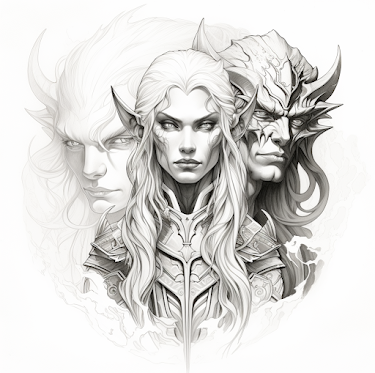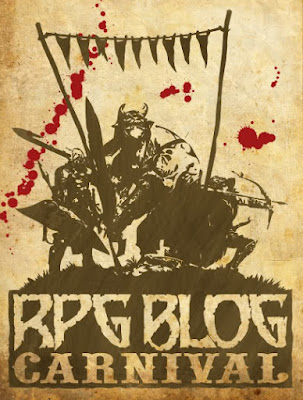Dökkálfar and Ljósálfar
These are the "dark" elves and "light" elves (respectively) of the Norse and Germanic myths. I kept their names intact because they felt different enough for, yet close to, "Dark Elf" and "Light Elf." I have discussed the Dökkálfar before, and they are worth revisiting. For this, I wanted to return to an idea I had in the late 1980s of a "Progenitor Species" of all the elves and faerie creatures. It's something similar to what the Sidhe and the Eladrin have done in my games after and especially in the 2000s. This is returning to that idea shed of the connotations connected to the Sidhe.
This is also something I am developing for my Wasted Lands campaign, which I'll be talking about more and more.
For these myths, I am also combining bits of the Greek nymphs and Roman Genius loci into a single idea. Thus these people are very specific to their environment, so the Light vs. Dark bifurcation. I am purposely trying to avoid distinctions like Seelie vs Unseelie courts. That is another part of the world (though close by) and centuries away.
The Álfar
The Álfar were a race of immortal, nearly divine people that some claim existed before the gods. Their origins vary, but almost all agree they are the children of the Earth (Großmutter). One group lives above ground and cherishes the light (Ljósálfar) and another lives underground and loves the dark (Dökkálfar).
It is believed that these creatures are the progenitors of all nature spirits (elves, nymphs, dryads) and other earth creatures (kobolds, dwarves, gnomes). Like their forebears the have no souls but are not immortal.
ÁLFAR
FREQUENCY: Very Rare
NO. APPEARING: 1-2
ARMOR CLASS: 1
MOVE: 18"
HIT DICE: 10+10 (55 hp)
% IN LAIR: 90%
TREASURE TYPE: Q (x10)
NO. OF ATTACKS: 2
DAMAGE/ATTACK: Sword (1d8+3) or by spell
SPECIAL ATTACKS: Spell
SPECIAL DEFENSES: +1 or better weapon to hit
MAGIC RESISTANCE: 45%
INTELLIGENCE: High
ALIGNMENT: Chaotic Good (50%) or Chaotic Evil (50%)
SIZE: M (6')
PSIONIC ABILITY: Nil
The Álfar are the progenitor race of all elves and other faerie races. Some also claim that dwarves and gnomes can trace their ancestry to these people. They are divided into the Ljósálfar (Light) and Dökkálfar (Dark) depending on where they live: above or under the ground, respectively.
Regardless of their Light vs. Dark viewpoints, they are still the same species.
Álfar can attack with a sword twice per round or cast spells as a 10th-level magic-user. They have access to all magic-user spells and many unique ones as well.
Courtesy is tantamount to the álfar. They will not attack someone honoring the rules of hospitality, but these rules must be adhered to strictly. They have been known to curse mortals that displease them for even the smallest of slights, and reward them with powerful magic for those that treat them with courtesy and respect.
The Dökkálfar live underground and are often considered to be evil. The Ljósálfar live above ground in a "land beyond the forest" and are most often thought to be good but no less dangerous to deal with.
Links
- One Man's God Special: Syncretism Part 3, the Roman-Norse Pantheon
- One Man's God series
- Monstrous Mondays: D&DGII The Monsters of the Black Forest Mythos
- My overview and rules for these postings



2 comments:
It seems that if you're merging Romans and Goths together that some conflation or portmanteauing of the languages should be occurring in the naming of things. So with that in mind one alternative for the 'light elves' and 'dark elves' could be luxálfar and umbrálfar.
I considered that back when I started this idea, but I decided to lean into more Germanic languages since this (hypothetical) group of people settled in Germany.
And, maybe more to the point, my Latin is rather terrible.
Post a Comment